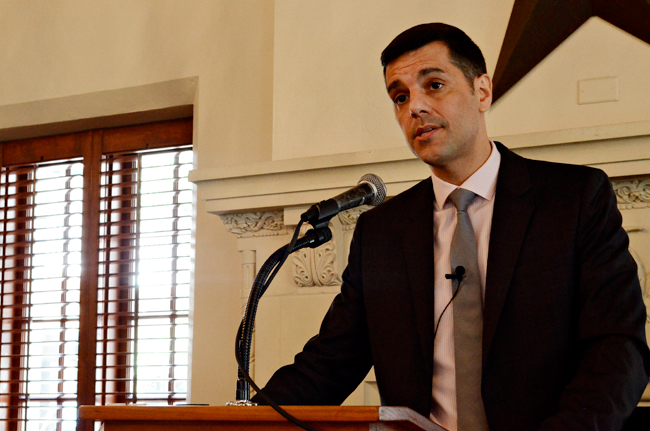Col. Gregory Daddis, history professor at the U.S. Military Academy West Point, spoke on campus Tuesday about the “salesmanship” of the Vietnam War, analyzing propaganda released at the time to convince Congress and the American public to support the war.
“What I would like to do this afternoon is talk about the truth,” Daddis said.
After looking over statements released by Army Gen. William Westmoreland and other senior war managers, Daddis said that the Vietnam War illustrates the dangers of over-propagandizing.
Daddis said, in contradiction with the public’s view of the war, Ambassador Ellsworth Bunker told the host of “Meet The Press” that his South Vietnamese allies were making excellent progress, while Westmoreland said he could easily see the growing optimism wherever he went in the war-torn country.
“We are making progress,” Westmoreland said. “Within two years or less, we will be able to phase down the level of military effort, which means that we could reduce the number of people involved.”
However, Daddis points out that three months later the country was attacked by the North Vietnamese Army and the National Liberation Front, better known as the Viet Cong.
“The American military apparatus in Vietnam became a vast lying machine, telling Washington what Washington wanted to hear and insisted upon hearing,” said David Halberstam, Vietnam correspondent for “The New York Times” during the war. “The purpose of this vast lying machine was to propagandize our alleged progress in the war and convince the congress and American public to support the war.”
Daddis said America’s status in the war was a mystery in 1967. Officials were not able to determine American progression during the Vietnam War and answers to whether the war was moving in a positive direction depended on who was asked.
Daddis said, if the government loses the public’s trust, gaining it back may not be easy.
“It’s possible that language — this vague language, this imprecise language — requires us as the public to question the relation of truth to any larger wartime assessment, and certainly I think Vietnam also illustrates the dangers of overselling progress in wartime assessment,” Daddis said. “The credibility of a government and its senior officials is a precious commodity that is difficult to replenish once it begins to slope.”




















